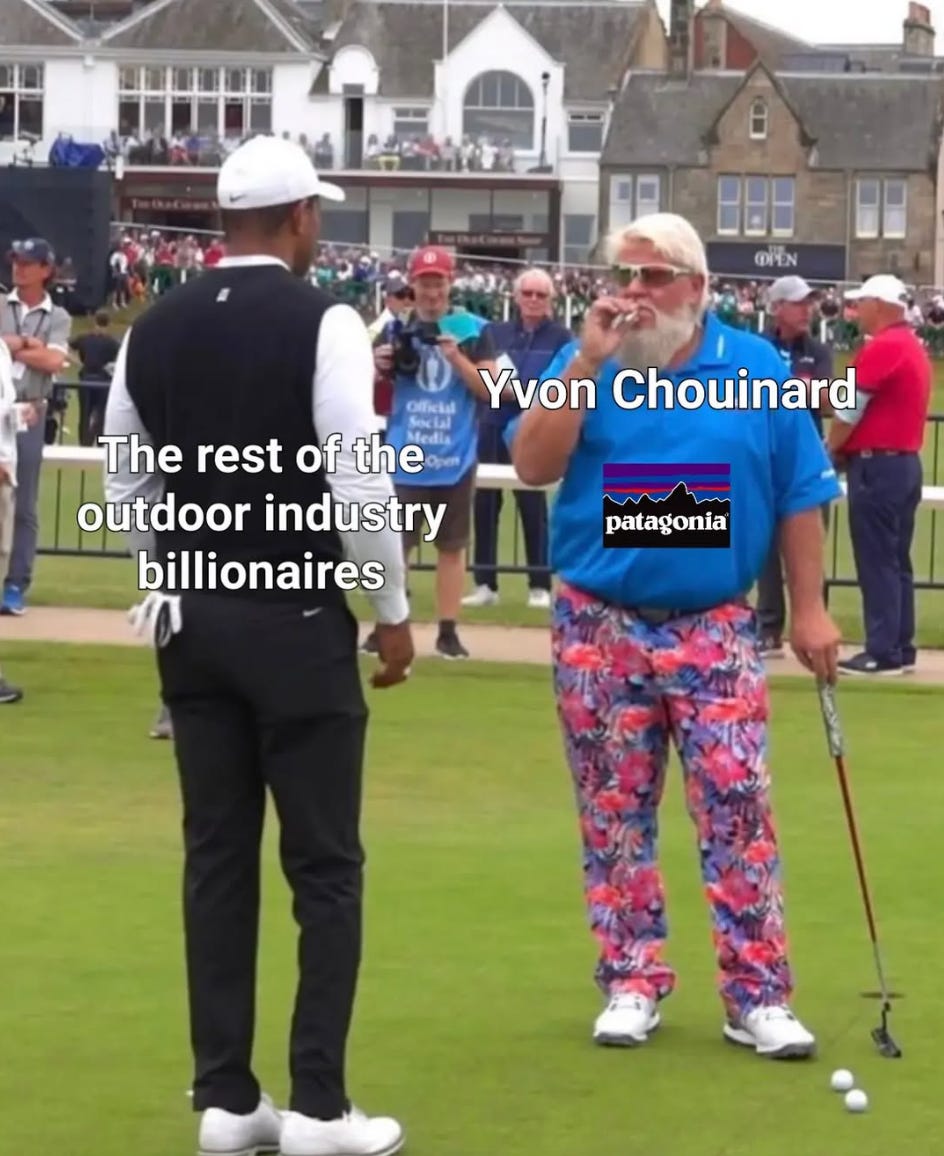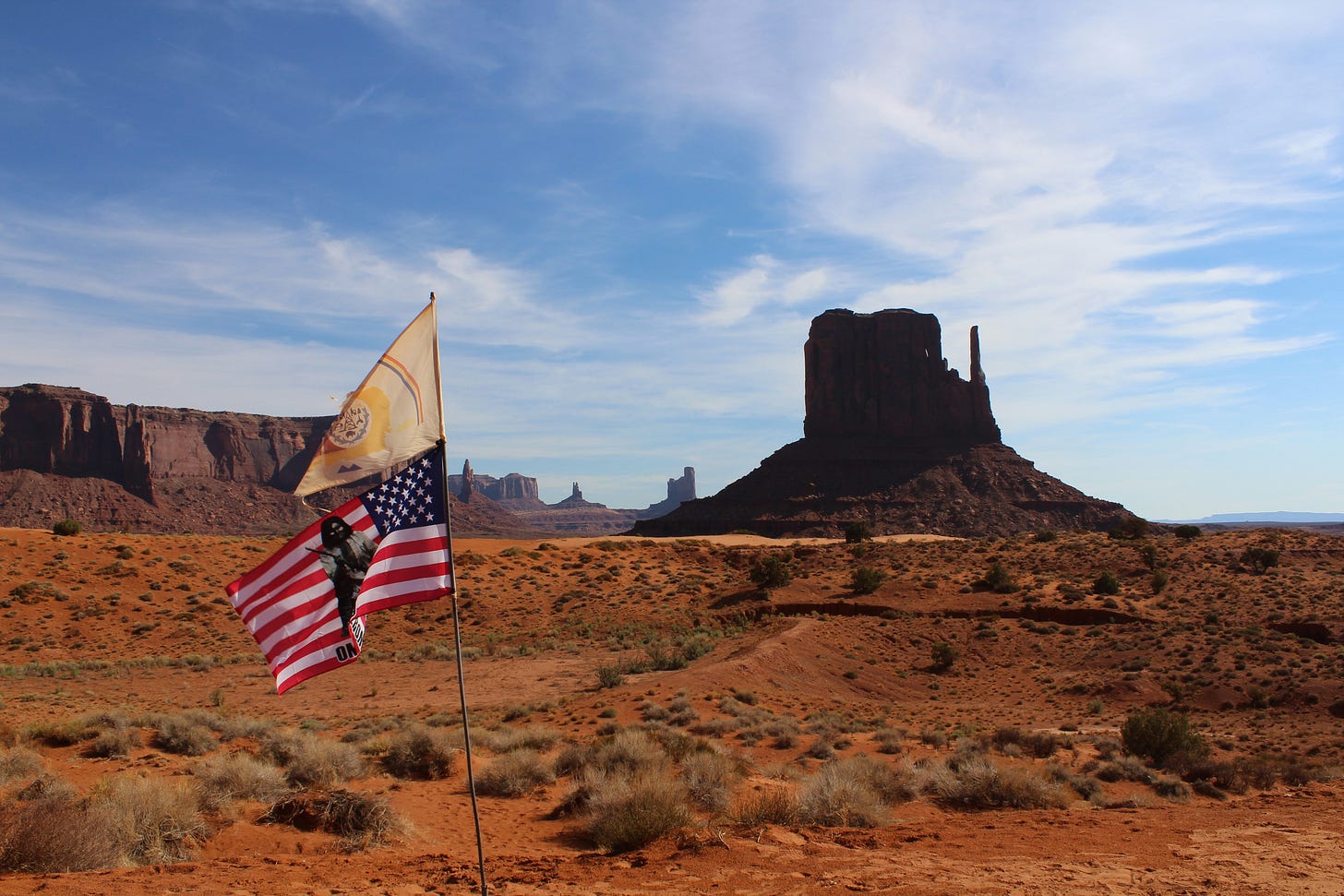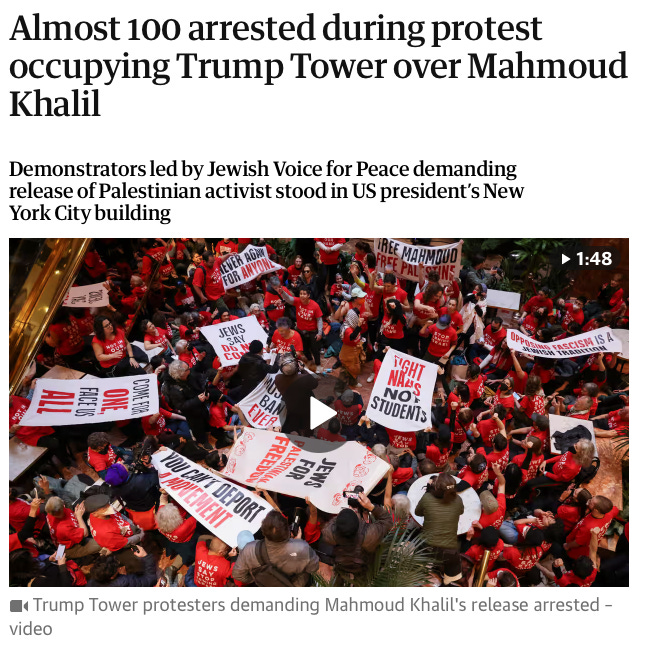Moving Beyond the Back-Patting
My thoughts on The Announcement podcast series by Looking Sideways and what it can teach us about the outdoor industries response to climate action.

I just finished my second full listen of The Announcement - my friend Matt Barr's audio documentary on Patagonia's announcement in 2022 that they were giving away the company to make "Earth Their Only Shareholder."
This is 100% one of the most important pieces of journalism in the outdoors world in recent times. To be honest it goes way beyond the outdoors, especially relevant in these last few months when people have suddenly woken up to the problematic influence of billionaires and corporate interests in politics. Ever since Matt started Looking Sideways back in 2017, I've been a huge fan of how he connects stories from the outdoors and action sports world to broader societal issues. While listening I had lots of different thoughts that ran through my mind about Patagonia, the outdoor industry in general, philanthropy compared to just taxing rich people and how we can put decision making in the hands of regular people. Here are my five take aways after listening to The Announcement.
1. The Announcement was significant but not even close to what needs to be done at the present moment
I've been a big fan of Patagonia for years and have been massively inspired by their political moves. Yet, in 2025, with Trump, Musk and other billionaires ravaging our democratic institutions, if Patagonia wants to be authentic in their mission to "save our home planet," they need to do more than just give away their profits to NGOs or political candidates. When I first shared the announcement on Instagram in 2022, I thought it was groundbreaking. I think Matt has done an amazing job of introducing a little bit of nuance to the whole thing.
I recently saw that the CEO of Patagonia, Ryan Gellert, wrote an op-ed for Time Magazine on Trump and the threat to American public lands. Personally I can't help feeling it will take more than a nicely worded op-ed to properly challenge these forces that we are now up against (while I was writing this Patagonia launched a tool to call your congress member as well - check that out here).

But imagine if Patagonia were to do something like for example send out a call to action to their entire email list mobilising people for civil disobedience? Their reach and influence is absolutely enormous - whether they like it or not they are a movement in itself. Im almost certain that it would be possible for them to build true grassroots political power through a protest movement if they wanted to. Listening to The Announcement really made me think about whether Patagonia’s rather bold claims to be in business to save our home planet need much more critical examination.
2. Philanthropy Is Not a Substitute for a Fair Tax System
Chuck Collins made the point in the second episode of The Announcement that philanthropy is not a substitute for a fair tax system. Philanthropy is often celebrated without much criticism, but why don't we just tax wealthy individuals more for the damage that they cause the planet? When corporations control where their money goes through philanthropy rather than paying into public systems through taxation, it simply concentrates decision-making power in private hands rather than democratic institutions.
One of the things that really stood out to me in the second episode was when Markus Lux from the Bosch foundation talked about the amount of money that philanthropy provides for schooling in Germany - 200 million euros. How long do you think that can keep schools running for? Just 45 minutes. This is the reality. The amount that rich people actually give away is pennies compared to state funding. In the US the total billionaires gave away in 2020 - 24 billion - could have funded the fiscal education budget for just a few weeks. The climate financing gap is $3 - 5 trillion annually while philanthropy provides less than $10 billion a year to fund climate action. Why does it get such broad, uncritical support when it contributes so little in the grand scheme of things?
At the end of the day (like almost every other single outdoor company) Patagonia has sold a load of clothing for the last 50 years. Gore Tex and other synthetic clothing no doubt has a pretty terrible impact on the planet (p.s read the No Bad Weather piece here on “The Cost of Staying Dry if you want to feel like you should stop buying gore tex tomorrow).
Should companies not just have to pay more in tax to make up for the environmental impact that they have?
3. We Need More Critique of Outdoor Industry Activism
If there is one thing that I have learnt from the last couple of years - is that the outdoor industry loves to pat itself on the back about how much good we do. Markus Lux described the same problem perfectly in the philanthropy world when he said: “In philanthropy there is a principle mistake - the people working there think because we are doing something good, we are good - they dont realise the contradictions in their work”.
For me I don't think there is a better quote for accurately describing the contradictions that are so obvious in the outdoor industries contribution to climate and environmental action than this. There is so much back patting that goes on about the conferences we attend, the latest sustainability report, the endless “statements” from CEOs on this issue or that, the brands boasting on social media about the % of their profit given to charity - I could go on and on. What is so often missing is the critique. How much impact are we really having? How much carbon have we really stopped going into the air? How many people have we really mobilised for action? What concrete political changes have we really contributed to? I think these are all questions which need to be addressed if we are to move beyond the echo chamber of back patting.
So for me The Announcement was music to my ears. Finally - honest critique of a major decision in the outdoors world which was at the time celebrated universally - myself included. As others have said - I do think the podcast could have gone more into the Holdfast Collective - the organisation Patagonia has set up to distribute the money. It all seems a bit hidden and opaque.
This is what it says about it on Patagonias website: The Holdfast Collective (Collective for short) will use every dollar received to fight the environmental crisis, protect nature and biodiversity, and support thriving communities, as quickly as possible. As a 501(c)(4) not-for-profit organization, the Collective can advocate for causes and political candidates in addition to making grants and investments in our planet.
Funding for the Collective will come from Patagonia: Each year, excess profits—money we make after reinvesting in the business (including money we want to save for unforeseen events, like a pandemic)—will be distributed as a dividend to the Collective to be used for its work.
I didn’t really find anything about its decision-making processes, priorities for funding and governance structure. I do think this is problematic because it contradicts Patagonia's often stated values of democracy and accountability—when potentially billions in funding is controlled by an organisation which seems basically shielded from public scrutiny. It perpetuates the same power imbalances that plague traditional philanthropy, where wealthy donors determine the priorities. Which brings me to my next point: we need to put decision-making into the hands of regular people.
4. We Need to Put Decision-Making in the Hands of Regular People
The biggest takeaway from listening to The Announcement was the feeling that, in 2025, putting the power into the hands of ordinary people is absolutely the most important thing we can do. There is a reason why Reform, Trump and other right wing parties around the world are doing so well. People are totally fed up with a political class that don’t listen to their needs and only care about the interests of international capital. People simply do not feel heard. If they were able to come together and talk as humans - without the media spin, the lobbying and the social media outrage - I think that many more people would realise that they have much more in common with their neighbour than people like Nigel Farage or Donald Trump. What people are looking for is simply the agency to shape their own future. They want a decent job, good public services, a safe climate and a quality of life for themselves and their family. The right wing forces rampant throughout the world - funded by the billionaires - are weaponising this distrust in politics to grow their movement. Chris Hedges wrote way back in 2007 in his book “American Fascists: “The rage of those abandoned by the economy, the fears and concerns of a beleaguered and insecure middle class, and the numbing isolation that comes with the loss of community, would be the kindling for a dangerous mass movement”.
So that is why I think that if we are to stand any hope of legitimately offering an alternative - we have to focus our attention (and in Patagonias sake: resources and funding) on ways to put decision making into the hands of regular people. In the second episode of The Announcement Immandeep Kaur said - "Once you get a taste of what happens when people come together - you can't really forget that”. I think this is what it is all about and what we should be striving towards. Giving people agency. Giving people a sense that they can play a part in shaping the world. Giving them a concrete way to feel like their voice is heard. Does Patagonias announcement do that? Im not so sure.
That is why I liked this follow up episode that Matt did with Jon Alexander called The Announcement: We Are Citizens, Not Consumers. Jon makes a great point about how the truly revolutionary act would have been for Patagonia to set up a citizens assembly to determine how best the profits should be spent. How is the Holdfast Collective really any different from other billionaire-controlled foundations that decide what's best for everyone else?
True democratic empowerment would mean shifting not just resources but actual decision-making power to regular people.
5. So, what do I think Patagonia should do?
Of course I still think that Patagonia are doing more than almost any other outdoor company to genuinely use their company to create change. They are not afraid to get political which is more than can be said for so many brands. I also know that it is easy to sit on the outside of these things and criticise but much harder to actually be in it making the difficult decisions. So for that, and for all the work they do on trying to lessen the impact that their products have on the planet, they should be celebrated and held up as a figurehead.
However, I do think that Matt’s Announcement series has been very effective at lifting the lid and elevating the conversation a few steps higher than just “oh Yvon gave the company to the earth, that’s great”. It has allowed us to explore what it really means to be in business to save our home planet. Personally, I now think that Patagonia giving the company away was not as quite the big story that it was touted as by the outdoor community back in 2022. The world is also now in a very different place in 2025 than it was in 2022. I get quite terrified about what is happening in the states right now. It feels like democracy is getting shredded right infront of our very eyes.
Do I think that this requires a different approach? Yes, I do. I don’t think you can go up against fascism with nicely worded letters and calls to congress. I think in order to go up against fascism you need to build a mass movement that uses civil disobedience and gives people agency through citizens assemblies. It is quite clear that the people in charge in the states right now have no care for the rule of law - so will the ordinary tactics of sending petitions, calling politicians and going on a march suffice?

Imagine if, to show resistance against the sell off of public lands, Patagonia sent out an email to every single one of their customers in the States and created a pathway for them to come to Trump tower and occupy it until they got arrested? I don’t know how big Patagonia’s email list is, but I wouldn’t be surprised if they could have thousands of people signed up for action within a matter of days.
I think this moment in history requires new thinking and to not be afraid to take risk.
I am going to think more about this topic over the next weeks and come with a follow up article going into more concrete ways that I feel like Patagonia could respond to this moment in history.
I will post a new article every Tuesday. Next week I will send out an article I wrote about the yearly climate conference that just happened in Sogndal - the town in Norway that I live in. The article is titled Do We Really Need Another Climate Party. It just got published in my local newspaper and I have been getting a lot of criticism for it so I am interested to hear what people think 😂
Click the button below to get the next article straight to your inbox. Cheers.




Thanks for sharing the podcast Calum! I hadn’t come across it before, but I’ll definitely give it a listen this week.
Having worked within the philanthropic sector myself, including for major foundations, I completely agree with so much of what you’re saying. No “good deed” from billionaires or corporations comes without a trail of exploitation, of people or the planet somewhere down the line.
The rebranding efforts of the ultra-wealthy through their passion projects often mask the deeper issue: they’re pulling power and resources further away from the people who actually need them. The tax breaks, the PR spin, and the unchecked influence over public life shouldn’t be applauded, they should be scrutinised.
I’m really looking forward to following along with your work and hearing your thoughts on what a more radical and people-powered response could look like. Bring on the controversial next post it sounds like a conversation worth having.
👏👏👏